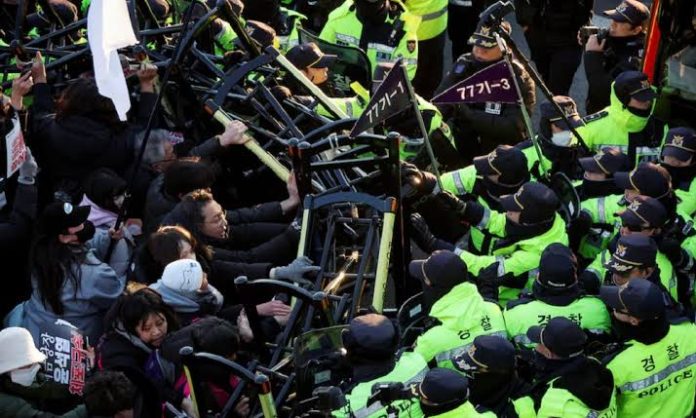South Korea is facing an unprecedented political crisis as presidential guards and military troops successfully blocked an attempt to arrest impeached President Yoon Suk Yeol. The six-hour stand-off on Friday has intensified tensions in the country, raising questions about the rule of law and the limits of presidential power.
A Standoff Inside the Presidential Compound
Early Friday morning, officials from South Korea’s Corruption Investigation Office for High-Ranking Officials (CIO), accompanied by police, arrived at the presidential residence in Seoul to execute an arrest warrant against Yoon. However, they were met with strong resistance from over 200 members of the Presidential Security Service (PSS) and military personnel assigned to protect the president.
Despite being outnumbered, the investigators attempted to push forward, but the presence of armed security personnel made the situation too dangerous. After six hours of confrontation, the CIO called off the arrest attempt, citing safety concerns.
Meanwhile, hundreds of Yoon’s supporters, chanting slogans reminiscent of Donald Trump’s “Stop the Steal” campaign, gathered outside the compound to protest his arrest. This public demonstration further complicated the authorities’ efforts.
Why Is Yoon Being Investigated?
Yoon Suk Yeol faces serious charges of insurrection following his shocking attempt to impose martial law on December 3, 2024. The move, which he claimed was necessary to “eliminate anti-state forces,” was widely condemned as an authoritarian overreach. South Korean lawmakers swiftly responded by voting to impeach him, making him the first sitting president in the country’s history to face an arrest warrant.
While South Korean presidents typically enjoy immunity from prosecution, insurrection is one of the few crimes that can bypass this protection. The arrest warrant, approved earlier this week, remains valid until January 6.
Legal and Political Implications

Yoon’s legal team has dismissed the arrest warrant as unlawful, arguing that the CIO lacks the authority to investigate insurrection charges. His lawyers have also threatened legal action against the police if they continue to assist the investigation.
In response to the failed arrest, the CIO announced it would take alternative steps, including investigating the leadership of the PSS for obstruction of justice. There is also speculation that acting President Choi Sang-mok could be pressured into ordering the security forces to cooperate with the arrest. However, Choi has remained silent on the matter.
What Happens Next?
The CIO still has a limited window to carry out Yoon’s arrest, but the likelihood of another stand-off remains high. The case has also reached the Constitutional Court, which must decide whether to permanently remove Yoon from office or reinstate him. The next hearing is scheduled for January 14.
Meanwhile, Yoon’s former defense minister, Kim Yong-hyun, has already been indicted on insurrection charges. If Yoon is also formally charged, he could face a lengthy trial and possible imprisonment.



